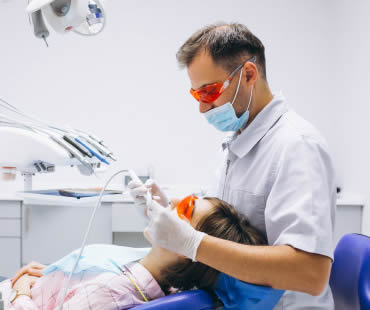
Your smile is a valuable asset, but needs care to ensure it maintains its beauty. It’s essential to brush at least twice a day and floss once a day, but other factors can influence oral health. The following pointers could help you maintain a healthy smile for life.
Book Regular Dental Checkups
Most dentists recommend patients visit them twice a year, although some people may benefit from more frequent checkups. These visits are essential for your dentist in Toronto to examine your mouth, and can help detect any early signs of disease before they become a problem.
Watch Your Diet
A healthy balanced diet should include plenty of fruits and vegetables as well as lean proteins and low-fat dairy products. This will help provide your teeth and gums with all the nutrients needed to keep them strong and healthy, and promotes overall good health.
Quit Using Tobacco Products
Smoking or using tobacco products is well known for causing stained and discolored teeth, and smokers are more likely to have bad breath. In addition, smoking makes it harder for your gums to heal and increases the risk of oral cancer.
Quit Bad Oral Habits
Using your teeth to open packets, chewing on ice cubes and pens, and biting your nails can all cause small fractures and chips in your teeth. Your dentist can offer useful advice on quitting these habits.
Don’t Ignore Any Early Signs and Symptoms
If you develop toothache or notice your gums bleed when you brush or floss, contact your dentist in Toronto right away. These diseases are far easier to treat when detected early. Ignoring tooth sensitivity that could indicate a small filling is needed might mean you’ll eventually need a root canal, or even that you lose the tooth completely.
Protect Your Mouth
Popular activities such as football, soccer, basketball and hockey can all cause facial injuries. Even noncontact sports such as skateboarding may be hazardous. Your dentist can provide you with a custom-made mouth guard that will help protect your teeth and jaws during sports.
Our dental office is located in Toronto

Depending on the degree of gum disease you have been diagnosed with, treatment can vary extensively. It can range from having a regular teeth cleaning and paying more attention to dental hygiene, to complex and often painful surgery. If you’ve been told you have a problem with your gums, seek treatment immediately.
Your dentist will perform a gum exam to decide the best treatment plan. This includes measuring the gum pockets around your teeth, noting inflammation, and checking gum recession. If gum pockets are extensive, it may mean you have bone loss. In that case, your dentist might refer you to a gum specialist called a periodontist.
Gingivitis is the earliest stage of gum disease. All that may be required is a thorough professional cleaning, better oral hygiene, consistent checkups, and allowing time for gums to heal. If gum problems have advanced, a deeper professional cleaning called scaling and root planning may be needed. Medications might be prescribed to treat infection. If the areas don’t respond to these treatments, gum surgery can be performed to remove diseased tissue, save the remaining gums and bone, and allow a better environment for good future oral health.
Receding gums sometimes are not severe enough for any treatment, but cosmetic concerns may warrant a gum graft procedure. It involves surgically removing tissue from another area of the mouth and grafting it onto the receded area. Another issue might be a gum abscess, which requires deep cleaning to remove diseased tissue and any pus that is present. Antibiotics will likely be needed for the infection. Once the abscess is cleared, further treatment may be needed to avoid a recurrence.
As you can see, there are a variety of possible treatments depending upon the severity of your gum problems. Of course the best solution is to avoid gum issues in the first place by maintaining good oral hygiene and regular dental checkups.
We look forward to seeing you in our Toronto dental office

The traditional silver fillings that patients have been getting for many years have come into the spotlight in recent years. Some people wonder if these silver, or amalgam, fillings are safe because they contain small amounts of mercury.
Background
Amalgam fillings contain a mixture of half liquid mercury and half a blend of silver, copper, and tin. This material is soft and malleable, which makes it easy to be sculpted to fit well into the tooth and not affect the patient’s bite. Amalgam fillings have been used to fill cavities for over 150 years.
Risks
The concern about mercury as an ingredient in amalgam fillings is due to the health risks of toxicity or allergies associated with exposure. Significant mercury exposure can cause chronic illnesses, autoimmune disorders, birth defects, oral lesions, and mental disorders. The FDA has investigated the safety of amalgam fillings, however, and determined that the mercury levels are too low to present adverse health risks for adults or children over age six. It has also been deemed safe for nursing mothers to have amalgam fillings. Both the FDA and the American Dental Association maintain that these types of fillings are safe.
Alternatives
Patients who are uncomfortable with amalgam fillings may choose composite resin material instead. This newer type of filling is used in about 70 percent of fillings performed today, and many patients prefer the tooth-colored resin because it is less noticeable in the mouth than silver fillings. Patients who have concerns about amalgam fillings already in place may ask the dentist about switching to composite resin instead.
If you live in the Toronto area contact us today

Modern lifestyles can be extremely stressful as many people have to deal with deadlines, demands and other frustrations that make up daily life. This can be an issue if you’re constantly under stress as it may affect your health. There are numerous health conditions that can be affected by high stress levels, and one of these is teeth grinding.
What Is Teeth Grinding?
Teeth grinding, or bruxism, is a condition that causes you to clench and grind your teeth together. It normally occurs during sleep so you may not even realize you have bruxism. This condition is likely to be identified by your family dentist in Toronto due to teeth becoming worn down and chipped, or quite often a sleeping partner will complain about the grinding noise during the night.
What Does Stress Have To Do with Bruxism?
Teeth grinding has been linked to high levels of stress and anxiety. It’s been shown that people under stress are more likely to grind their teeth, particularly if they don’t have any coping mechanisms.
How Could Teeth Grinding Affect Me?
Teeth grinding can have more of an effect than you might imagine. It can cause teeth to become cracked, sensitive or even loose. Excessive grinding can damage the gums and bone surrounding your teeth, or may cause a painful disorder called TMD. This affects the jaw joints or temporomandibular joints, and can cause headaches, earache and facial pain.
How is Bruxism Treated?
Your dentist in Toronto is likely to recommend a custom-made night guard which is worn while sleeping to protect your teeth and jaws from any further damage. It works through preventing your teeth from coming into contact. Additionally, you may be prescribed a muscle relaxant to help prevent clenching. It can be helpful to reduce stress levels through various measures which can include exercise, yoga, meditation or stress counseling.
Our dental office is located in Toronto

You don’t have to grace the movie screens or magazine covers to have a magnificent smile. With the modern cosmetic dental procedures offered at Brown, Reynolds & Snow Dentistry, you can achieve a gorgeous appearance through simple options like teeth whitening, cosmetic bonding, or Invisalign clear aligners. The following tips will help you put your best smile forward, no matter what else you decide to do:
• Make dental visits a priority. The American Dental Association (ADA) recommends checkups twice a year. These appointments allow your dentist to monitor your oral health and address any problems that arise. Plus, the cleanings leave your smile in tip-top shape.
• Follow a good oral care routine. To keep your smile looking and feeling great, you need to brush at least twice a day and floss regularly. If you don’t keep up with these tasks, you may increase the chances of developing issues like tooth decay and gum disease.
• Create a natural look. The most attractive smiles are the ones that don’t look artificial. Your mouth and lips help create the whole effect. Keep your facial muscles relaxed, and moisturize your lips to complete the entire look.
• Try to relax. Overall happiness contributes to the impression you give others, including in your smile. Try to remain stress-free so that your inner peace and joy will be reflected in your smile’s glow.
• Practice makes perfect. If you feel nervous, there’s no harm in trying out your smile. Use pictures of yourself that you like as examples; then, make an effort to smile at random strangers to boost your confidence.
If you need a dentist in Toronto contact us today
If you have a true dental emergency, make sure to consult your dentist right away. Some situations may arise, however, that after hours, so it’s important to know how to proceed. These tips will help you take good care of yourself or someone you love:
• Bitten lips, cheeks or gums
First, gently rinse the area with cool water. Apply light pressure with gauze or a wash cloth. Control swelling with crushed ice in a Ziploc bag.
• Bleeding gums
Usually caused by gum disease or brushing too hard, treat bleeding gums by rinsing with warm water and creating a regular home care routine that includes brushing twice a day and flossing regularly. See your dentist for a complete exam.
• Canker sores
Rinse the area with warm salt water. Avoid spicy, acidic, or very hot foods when you have an open sore. If the area doesn’t heal in two weeks, contact your dentist.
• Broken or cracked tooth
Carefully rinse the area with water, salt water if possible. Don’t remove any pieces and bring all fragments with you to the dentist’s office.
• Loose baby tooth
Don’t pressure your child to pull the tooth. Encourage your son or daughter to wiggle the tooth side to side as well as back and forth to help free the tooth.
• Teething pains
Place a wash cloth in the freezer and allow your baby to suck on it to relieve pain. Mild over-the-counter analgesics may also help.
• Toothaches
Avoid irritating the tooth. Don’t bite down on the area, and avoid hot or cold substances. Schedule an appointment with the dentist as soon as possible.
Our dental office is located in Toronto






 E-Mail Us
E-Mail Us  416-595-5490
416-595-5490








